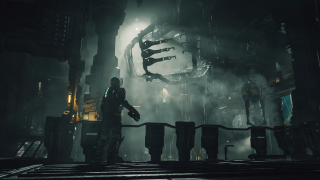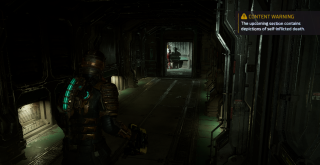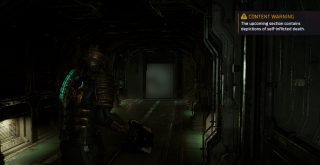Accessibility and Player Choice in Dead Space
Learn how Motive is innovating to allow even more players to enjoy Dead Space™.
When the team at Motive™ set out to remake Dead Space™, they knew they wanted to ensure the game could be played and enjoyed by as many people as possible.
“Dead Space is a classic that changed how horror games were perceived when it was released,” says Lead Senior Experience Designer Christian Cimon, “so it made sense to revive that game and share it with a whole new generation. But the game came out 15 years ago, when accessibility features were less common. Things like subtitles, menu narration, control-remapping, and the like are pretty much expected now, so we wanted to make sure the remake aligns with today’s highest standards.”
Of course, Motive being Motive, meeting expectations is just a starting point, so this new Dead Space sets out to build on standards in some key ways.

Represents Game In Development
YOUR GAME, YOUR CHOICE
First, the game offers an extensive array of customization options with some fine-grained control. These include:
- Menu Options: Menus can be narrated, with adjustable narration volume.
- Colorblind Mode: Preset color adjustments support Protanopia (Red Weak), Deuteranopia (Green Weak), and Tritanopia (Blue Weak), and color contrast levels can be adjusted.
- Control Customization: The game allows players to complete quick time events with a single button-press; switch the Sprint, Aim, and map zoom controls to toggle mode; and change the command to close audio and video logs to a tap rather than having to hold down the button. In addition, every input can be remapped to a different button.
- Aim Assistance: When aim assist is active, players can elect to activate “friction,” which slows down camera movement when the target laser is nearing an enemy. The player can also choose to adjust how long the camera focuses on an enemy when targeting them—including turning this “magnetism” off entirely.
- User Interface: Players can turn off the kinesis symbol when aiming, or activate a persistent dot onscreen that can improve some users’ experience with the game camera.
- Motion: The floating effect of the main menu can be disabled, and players can turn off camera shake.
- Subtitles: Not only can subtitles be enabled or disabled, but the player can also adjust font size, enable all-caps style, invert the colors of the text and the background, adjust the opacity of the background, show or hide the speaker’s name, and choose whether to show that name in a different color than the rest of the text.
It’s a comprehensive suite of options already—but the team didn’t stop there when it came to broadening the audience. “Motive recognized that some players may choose to avoid seeing certain types of content typical in horror and gore games,” says EA’s Program Lead for Game Accessibility Morgan Baker. “So the team wanted to explore potential ways to allow players to control how they view the game’s more graphic content.”
The solution: In a first for this type of game, Dead Space includes a content warning feature to allow the player to be fully informed about potentially sensitive content—and even an option to hide that content if the player chooses. “The first option will warn you of a potentially disturbing scene ahead of time,” Christian says, “by displaying a non-intrusive popup that gives a brief description of the type of event that’s waiting around the corner, or in an audio or video log before you play it. The other option will actually hide the upcoming scene behind a screen effect. You’ll still hear any audio, but a blurring effect will hide the visuals until the scene has played out.”

CONTENT WARNING: The upcoming section contains depictions of self-inflicted death.

CONTENT WARNING: The upcoming section contains depictions of self-inflicted death.
The team is careful to stress that these content warning features are fully optional—and disabled by default. “Dead Space remains a horror game, with gore and blood,” Christian says. “And furthermore, we didn’t want to go against the core of the game, so violence done to Necromorphs isn’t targeted; we’re mostly focusing on scenes involving intense violence against humans, strong psychological horror, or self-harm. And of course, there’s a lot of subjectivity that comes into play when trying to evaluate what’s disturbing.”
“All these features have room for growth, of course,” Morgan adds. “Game design is a continuous journey, and there’s always room for improvement.”
THE CONTINUOUS JOURNEY
So Dead Space is by no means the final stop on the path to greater inclusion. “Accessibility features are becoming part of the normal set of features,” Christian says. “We’re slowly converting accessibility features simply into game features. And that makes sense as a developer, to be able to share the love of games with even more people—but it also makes good business sense, because it means a bigger potential audience for the game.”
“It’s about addressing and removing barriers that come between our players and games,” Morgan says. “Accessibility improves experiences for people of all abilities and backgrounds, allowing for better products and ensuring that more players can have an enjoyable experience. And the work done by the Dead Space team shows that increasing accessibility continues to be a priority for us.”
This is, it should be noted, just the latest example of EA’s commitment to accessibility. Take, for example, the launch of the Inclusive Player Experience team (aka IPeX), and recently announced new additions to EA’s accessibility patent pledge, which provides competitors and developers with free access to accessibility-related patents and technology. This is all part of EA’s ongoing commitment to positive play, and to reducing or eliminating as many barriers to access as possible in video games.
“It’s so motivating to see a studio like Motive so invested in providing players more choices around how they consume horror content,” Morgan says. “It’s inspiring. And we hope to see more studios consider the same. Because ultimately, when we can all play games, we all win.”

